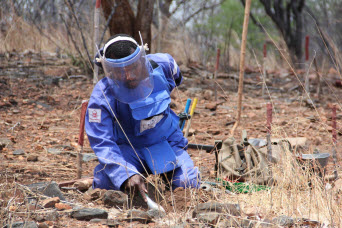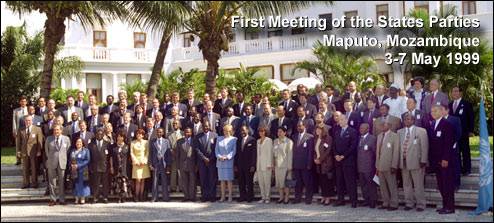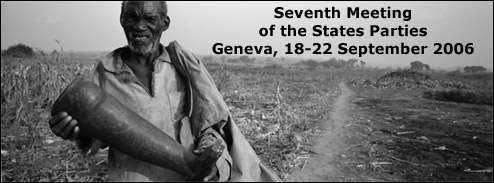The Maputo Review Conference on a Mine-Free World will be the third time that the international community has gathered at a high level to review the status of efforts to end the suffering caused by anti-personnel mines.
The location of the event is significant.
Mozambique symbolises this particular time in the life of the Convention for the following five reasons:
1) In the early 1990s, Mozambique was one of the countries where the tragedy caused by anti-personnel mines was one of the greatest.
Along with gravely affected countries in other regions, Mozambique was one of the birth-places of the anti-landmines movement.
This movement has achieved much and this can be seen first-hand in Mozambique.

Demining efforts continue in Mozambique - Photo HALO Trust
2) When the Convention was adopted, the clearance of all mined areas was a distant prospect and perhaps, to some, unachievable.
By the time of the Maputo Review Conference, however, all that will remain in Mozambique will be one specific challenge including along its border with Zimbabwe, which will also be cleared.
Mozambique’s progress over anti-personnel mines is the international community’s progress: These achievements have been reached together.
The Maputo Review Conference can give hope to those still addressing a landmine problem that an end is within sight.

3) Soon after entry into force of the Convention, Mozambique hosted and presided over the Convention’s First Meeting of the States Parties (1MSP) in May 1999.
The 1MSP established the Convention as the international community’s framework for mine action and set it on its path to ensure compliance with the Convention’s obligations.
With the Maputo Review Conference, the world will return to where international efforts to implement the Convention began.
Just as a foundation was established in 1999 for what needed to be done at that time, the international community now has a chance to act on what needs to be done at this particular time, fifteen years after it first gathered in Maputo.
4) In May of 1999, there were but 55 parties to the Convention and Mozambique was only one of 18 States in Africa that had committed to this movement. Regrettably, at the very time the 1MSP was taking place, new use of anti-personnel mines was occurring.
There are now 161 States that are bound by this Convention and the Convention is virtually univeralised in Africa. New use of mines is now rare and understood by both world leaders and ordinary citizens that mine use is an unacceptable behaviour in the modern world; the norms embodied by the Convention have taken hold.
5) The international community has made a solemn promise to mine victims. Unlike the destruction of emplaced or stockpiled mines, efforts to fulfil this promise must continue for years.

In 1999 the international community first expressed that a comprehensive approach to victim assistance is required with our efforts being part of broader approaches to health care, rehabilitation and human rights.
As a developing country, Mozambique knows that ensuring the full participation of all citizens, including mine victims, in the social, cultural, economic and political life of a nation is a tall order.
This Convention has made a great difference. However, as an added value, the Maputo Review Conference on a Mine-Free World is a chance to again leverage high level international interest to continue momentum in this area and revive the Convention in a changing and new environment.
